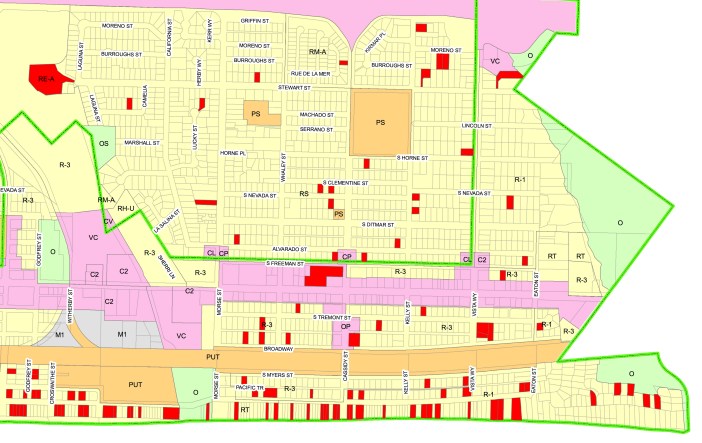At Wednesday’s council hearing, the city will be considering a proposal to change the role of the Planning Commission. The proposal needs to be sent back for further public hearing.
Agenda item #23 (“Introduction of an Ordinance Amending Certain Articles of the Comprehensive Zoning Ordinance”) has two parts. One part is a routine update of various aspects of the city’s zoning. The second part (changes to Article 1 of the zoning ordinance) reduces the authority of the Planning Commission. The former was supported by the PC at their October 22 hearing, while the latter was rejected.
Today in Oceanside — as in almost every city in California — for most items the Planning Commission decision is final unless appealed to the council. This has three benefits:
- The PC has a chance to do a more thorough investigation of the issues than the council, for which land use is just one of its major responsibilities.
- For important issues, there are two hearings — the PC and the council — thus allowing the maximum range of issues to be aired.
- The approach reduces the council workload by providing a full hearing for every case, but keeping off the council agenda all items where the city, applicant and community all agree on a mutually satisfactory outcome.
The proposed change is to make the PC’s decision only advisory, an automatically appeal everything to the council. This would reduce (or eliminate) the importance of the PC process, and also dramatically increase the workload of the council (likely reducing the time available for public comment at the hearings).
The stated reason for the change is that when the PC decision is appealed, it is harder (or sometimes people forget?) to bring before the council all the related issues — those decided by the PC and those decided by the staff not subject to PC review. It is not clear why this is a problem now, given it has not previously been a problem in decades of this relationship between the PC and council here in Oceanside (and elsewhere).
A simpler fix would be to adopt a policy (presumably by ordinance) that an appeal of any aspect of a project — either a decision of the PC or of the staff — appeals the entire project to the council. This way, the council is always considering the specific issue in the context of all the other related choices.
By combining this with an unrelated item, the impact of this change was not properly advertised for the Oct 22 PC hearing. Save South O asks that it approve the routine items, and send back the proposed policy change for a separate PC hearing to solicit public input, and see if it can develop a proposal that is acceptable both to staff and the PC. Residents who feel likewise should contact the council at Council@ci.oceanside.ca.us

